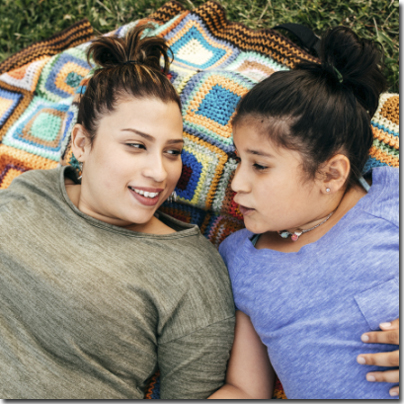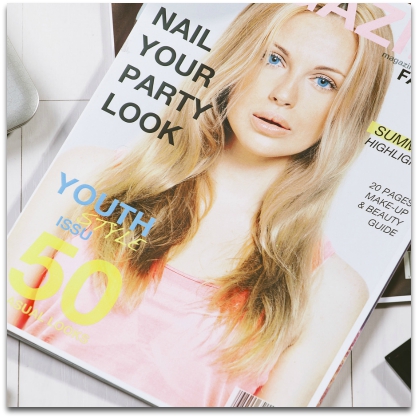
Does this sound familiar?
As they grow, you want your kids to feel great about their body, take pride in their appearance, and enjoy healthy self-esteem.
But you feel overwhelmed.
You feel overwhelmed because you don’t know how to help your child develop a positive body image when you’ve never quite mastered it yourself. You don’t know how to help them grow self-esteem when society is doing its damnedest to ensure otherwise.
So, you feel powerless. And you don’t know where to begin.
And it gets worse.
Because deep down, you believe your own fears about your body are true.
You believe you are in fact too large, too tall, too saggy, or any other number of meaningless ‘too’s’. You believe, as you have for a very long time, that your body should be better.
So, you put the issue of your child’s body image to one side.
You sit back, continue to think badly about your own body, and hope like hell it doesn’t rub off on your child. Sure, you make every effort to tell them they’re beautiful, but you can’t quite believe the same thing of yourself.
The trouble is, while you sit back, others are eager to take up the slack.
Televisions shout, billboards scream, and peers rudely whisper, until your precious child finally internalizes the message – “You are not good enough.”
If this sounds familiar, take a deep breath.
The truth is you have far more power to boost your child’s body image than you may think.
In this article I’ll review my personal struggle with negative body image and outline the strategies I’m adopting to ensure my children enjoy a very different reality. I’ll discuss 8 essential strategies with actionable challenges to help you begin to boost your child’s (and your own!) body image today.
A Lifelong Nuisance
Like so many of you, I’ve spent far too long feeling bad about my appearance.
I’ve never suffered an eating disorder or stuck to rigid, obscure diets, but I’m sick and tired of harboring an underlying, niggling belief that my body doesn’t quite make the grade.
With the help of daily yoga, an energy-boosting diet, and a positive mindset, I’ve come through a long-term fog of inadequate self-respect to emerge as a whole new me. I’m now fortified with ‘body image armor’ that’s difficult for negativity to break. I’m not happy with my appearance 100% of the time, but I’m on a mission to be.
It took me thirty-five long years to get to this point, and I know I’m one of the lucky ones.
Many men and women spend their entire lives feeling bad about their appearance – longing to be different, bemoaning the loss of their youth, and idolizing some unattainable notion of beauty. For instance, I know:
- new mothers who feel self-conscious of their round figures
- petite, toned women who refuse to put on a swimsuit and bare their skin on the beach
- men who feel ashamed of their not-quite-six-pack-abs
A recent British report calculates that women spend a total average of 31 years of their lifetime on diets, and men 28 years. Statistics indicate that poor body image starts shockingly young in the United States — 46% of 9–11-year-olds report they’re sometimes/often on a diet, and 78% of 17-year-old girls are unhappy with their bodies.
No one seems immune to the nuisance of poor body image.
8 Essential Strategies to Develop a Positive Body Image
Advertisers and media are constantly thinking up new ways to sell their ideals of beautiful bodies.
Advertising is now an intruder on your Facebook page, a pop-up annoyance as you shop on the web, and a poorly suited salesman littering your inbox with unsolicited offers. In the future, advertising is only going to get slicker, more personalized, and more insidious. We parents have one tough job ahead, so let’s get started.
#1. Fake It Until You Make It
 I know it’s far easier said than done, but boosting your child’s body image begins with improving your own.
I know it’s far easier said than done, but boosting your child’s body image begins with improving your own.
But you most likely have a lifelong dissatisfaction with some aspect of your appearance and may have many years of negative psychology to unravel.
Begin in the knowledge that feeling more positive about your body can be as easy as trying these techniques of ‘fake it till you make it’:
- wear a skimpy skirt in spite of your varicose veins
- put on a bikini that shows your pregnancy stretch marks
- have a ‘no makeup day’ once a week. Roll your shoulders back and stand proud.
Ignore the fact that you don’t feel as confident as you’d like to. Try these brave actions anyway, and you’ll soon fool your mind into following suit.
Challenge: Take a look in your closet. Is there an item of clothing you’d love to wear but feel ashamed to? Or perhaps there’s something you’ve always wanted to buy but never had the courage? Challenge yourself to buy/wear that item at the next opportunity. Bare it, flaunt it and strut your stuff with pride. If you’re worried about what people will think of you – wear it anyway. You’ll soon stop worrying about what people think of you when you realize how little they actually do.
#2. Watch Your Words
Words are incredibly powerful – much more so than we may realize. Sadly, negative or critical words often make the greatest, long-lasting impact.
– much more so than we may realize. Sadly, negative or critical words often make the greatest, long-lasting impact.
I can still hear my beloved Grandmother’s voice as I greeted her at the tender age of seventeen.
“Oh, you’ve really put on a lot of weight Rachael, you’re looking very heavy.”
My joy at seeing my grandmother was instantly replaced with a piercing sense of shame. My appearance seemed to disgust one of the most important people in my life. My heart and self-image were instantly crushed.
Know that your children listen to your offhand comments about the overweight, scantily clothed middle-aged women at the mall. They hear you say how dumpy you look in those tight jeans.
Loud and clear.
Negative words sting and scar, so take measures to protect your children by taking care with the comments you make about yourself, your children, and strangers you’ll never meet.
Conversely, positive words can have a magical impact. Try this exercise to tap into their wondrous effects today.
Challenge: Stand in front of a mirror. Take a good hard look at yourself and note aspects of your appearance that please you. Say them out loud – no one else need be around to hear. I bet it’s been a while since you noticed things you like about yourself.
As soon as you catch yourself pointing out the size of your butt, or your knobby knees – stop. Those thoughts are doing you no good. For instance, “I like my triangular earlobes, elegant décolletage, the strength of my legs, and my high cheekbones.”
You can try a similar challenge – either with friends or with your children.
Try to challenge yourselves each time you look in the mirror. Refuse to let those toxic, negative self-comments take hold. As you begin to think better of yourself, you’ll radiate positive energy your children will want to copy.
#3. Honor Physicality
 Bodies are so much more than potential eye-candy and mannequins to adorn. They’re instruments through which our inner strength, beauty and individuality are visible to the world. They’re vehicles for expression, movement, and joy, not merely objects to be sexualized and scrutinized.
Bodies are so much more than potential eye-candy and mannequins to adorn. They’re instruments through which our inner strength, beauty and individuality are visible to the world. They’re vehicles for expression, movement, and joy, not merely objects to be sexualized and scrutinized.
Help children understand this by honoring physicality. Sports, dance, movement of any kind will help create self-respect. Encourage children to get moving, but also role-model healthy physicality yourself.
I’ve practiced yoga since my early 20s when a back injury left me in crippling pain. But it was only recently I began to revere the grace, strength, and power of my body. I now appreciate its form and function much more so than how it looks in a way I haven’t been in touch with since I was a child.
And I’m not alone in this experience. The book ‘Yoga and Body Image’ is a collaboration of personal stories by yoga teachers of all shapes and sizes, describing how yoga practice saved them from poor body image. The interview with musician Alanis Morrisette, and how she overcame eating disorders, is particularly inspirational. The book is an intimate read about our power to move beyond the body-image obsession.
But while regular yoga practice can have a profound impact on body image, so can other physical activities. If yoga’s just not your thing, find something that is. Get in touch with your physical body and begin to tap into its mastery each day.
Challenge: Find a physical activity you and your children can enjoy each day. Be active together and at your own individual sport of choice. YouTube yoga videos for kids, cycling, swimming, dance and nature walks are all great options. Get your kids involved in choosing activities to increase their enthusiasm and watch as they begin to love their physicality.
#4. Emulate Self-Care
Being healthy is about so much more than body weight and size, and it is important children understand the multiple elements that combine to create health.
The children’s book Her Body Can illustrates this beautifully. It’s a rhyming book of poetic self-love with many body-positive declarations.
My children enjoyed this book, and it started a good discussion about how people feel when we make comments about their bodies.
Challenge: Parents can be great role models of healthy self-care. Show your children how to take care of their bodies by making time to take care of your whole self. Make your own wellbeing a priority – honor the value of a good night’s sleep, take time out to exercise, relax, and socialize, and enjoy many foods in moderation.
#5. Admire Individuality
 Humans are incredibly diverse. We’re all made to be different shapes, shades and sizes. We can help children feel confident about their individual appearance by admiring the variety of beauty around us. In modern multicultural societies, just walking down the street can provide countless illustrations of the beauty of difference.
Humans are incredibly diverse. We’re all made to be different shapes, shades and sizes. We can help children feel confident about their individual appearance by admiring the variety of beauty around us. In modern multicultural societies, just walking down the street can provide countless illustrations of the beauty of difference.
Talk with your children about aspects of yourself and others you think are beautiful. Is it:
- Isabelle’s thick wavy hair
- Emily’s kindness
- Dad’s big strong arms
- Anna’s sparkling, green eyes
- Mom’s warm smile.
This will help children appreciate that beauty comes in many forms – in personalities, behaviors and in appearance – and help them feel confident in their individuality.
Undoubtedly, there will be times when your child’s individual choice of clothing or appearance doesn’t fit with your own tastes. Take care in those moments to either keep critical views to yourself or compliment your child on how they’re developing their own unique sense of style. They’re busy figuring out who they are and how they want to be presented to the world, and supporting their efforts is crucial to helping them maintain positive body image and self-esteem as they grow.
Challenge: Point out different aspects of physical beauty and fashion on the television with your children. Try not to criticize those who choose to dress differently to yourself and become enthusiasts of healthy difference together.
#6. Model Moderation
Diet and food are a modern day ‘kettle of worms.’ It seems there are so many new opinions on healthy eating out there that we’ve become confused about what to eat. But it doesn’t need to be so complicated.
You don’t need a nutrition degree to teach your children how to enjoy energizing food, but it’s good to listen to common-sense dietary advice. Experts warn we should try not to label foods as ‘good’ and ‘bad’, but instead teach children about ‘sometimes’ and ‘always’ foods. We can also teach that ‘always’ foods will give them buckets of energy. I know my children eat healthier foods more enthusiastically when I tell them they’ll give them “more energy to zoom” in the school race.
Experts also advise that parents should ditch any talk of diets for good, and instead enjoy a healthful diet focused on moderation.
As children get older, it inevitably becomes harder to watch and control what they eat. If they understand how different foods make them feel, and what portion size is right for them, they’ll more likely make healthier food choices when you’re not around to dish the servings.
Challenge: Begin what can be a life-long casual conversation about food and the energy it provides at your dinner table tonight. Introduce the concept of ‘sometimes’ and ‘always’ foods and ask your children which foods they think fall into each category. In addition, challenge yourself to quit any talk of dieting – it’s not doing you or your children any good.
#7. Talk Advertising
 Advertising is powerful, but it’s also manufactured. You can demystify advertising by talking about techniques with your children.
Advertising is powerful, but it’s also manufactured. You can demystify advertising by talking about techniques with your children.
Topics you can discuss include:
- airbrushing
- computer alterations
- cosmetic surgery.
Check out short videos such as Media Vs Mind and 11 Facts About Body Image. Have a chat about why cosmetic and artificial tools are used and show children that people look very different under all that make-up and technology.
Challenge: If they’re old enough to understand, find and compare a candid and airbrushed photo of their favorite celebrity. Show how the ‘beauty’ they see in advertising is manufactured and discuss how it takes a great effort and expense.
#8. Compliment Behaviors
This morning I saw my four-year-old daughter being considerate of her brother’s feelings. She was telling me that he felt sad because he’d lost his favorite stone. She was very concerned, and it was touching to see. I told her she was very good at putting herself in his shoes, and that this made me feel proud.
She thought about this for a moment, then gave me a big, beaming smile.
By taking opportunities to compliment children on positive behaviors such as when they’re thoughtful, generous, kind and polite, rather than on how pretty they look, we can help them learn that developing a good character is much more important. Done regularly, this will provide great big boosts to their self-esteem.
Challenge: Look for opportunities to compliment your children on positive behaviors and characteristics today.
- Did Sophie’s teacher praise her for being extra-inquisitive with questions in class?
- Is Damien working hard to improve his math?
- Did another parent tell you how Ella took special care to help the new girl in class?
If so, seize the opportunity and jump on your instinct to praise.
The 2-Minute Action Plan for Fine Parents
Next time you take a moment to enjoy a cup of coffee, sit quietly and think. Be honest, but beware – the following questions may raise some negative emotions. Ask yourself:
- how do you feel about your own body?
- do you feel like a good role model for positive body image?
- what kinds of words and images make you feel bad or good about your appearance?
- do you make rude comments about your own or other people’s bodies in front of your children?
- have you noticed your child making a negative comment about their body?
The Ongoing Action Plan for Fine Parents
Unfortunately, there is no quick fix for negative body image. Mainstream notions of beauty are not going anywhere in a hurry and so will continue to surround us.
Whether it’s helping ourselves or our children, boosting body image will be a lifelong, uphill process. But start today on the lifelong path to becoming the teacher and role model of positive body image you have the power to be.
- Revise the 8 tactics outlined above. Acknowledge areas you’re doing well in and think a little harder on ones you’re not.
- Focus on your own body image. What can you do in the short and long term to improve your respect and admiration for your body?
- Vow to quit fad dieting and eating. Show children how to eat a sustainable, consistent diet in moderation.
- Enjoy fun, physical exercise regularly by yourself and as a family and love your bodies for more than their appearance.
- Surround yourself and your children with positivity. Refuse to criticize or be criticized.
- Read ‘Her Body Can’ with your children and enjoy the links in this article for a whole raft of helpful body image resources.
- Do your own body image research. Check out these 35 Body Image Books from ‘A Mighty Girl’.
My mother is incredibly judgemental about overweight people, feeling the need to comment with something like revulsion. When I was at college, she would make some comment about my appearance within an hour of my arrival home – I am 5ft7 and I was 130lb. I have had my shields up against her comments for decades but I know I have internalised a lot of the negativity.
I have made sure that I never comment on anyone’s weight in front of my children (and I try not to do it at all). We make a conscious effort not to label foods good or bad. We talk about whether it gives you long-lasting energy or not. I might say something is not a top food for nutrition. My kids are also fed up with hearing about fibre and the gut microbiome!
The step I was already starting on is getting out of baggy sweat pants and starting to wear “real” clothes on the school run even if I get changed for yoga/housework when I get home.
Thank you for this article.
Amazing post! This is great advice for parents out there who are still struggling with building a positive image for themselves. Kids mimic adults so it’s important to show them that we too have positive body image. Thanks for this!
Another great article Rach. This is something I am very conscious of having a baby daughter. Most important in my view is watching words within the family to ensure positive messages about body image. I am learning to accept and be proud of my post-baby body, rather than focusing negatively on my c-section scar. Thankfully there are a lot of great resources out there in this regard: http://queenofscars.com/the-physical-and-emotional-mark-of-a-c-section-scar/.
Thanks so much for this comment Jo. Yes, a woman’s body changes dramatically after birth – whether natural or c-section – but isn’t it incredible what our bodies can create! I’m in awe of the baby-creating process, and scars are such a small price to pay. I’m happy to hear you’re conscious of body-image comments even with such a young daughter – she’s a lucky little girl 🙂
Thanks for the excellent food for thought and new strategies Rachael. I am preschool teacher of children aged between 2-5yrs and even at that age they are forming ideas about what beauty is and a self-image of who they are. It is impossible to protect them from advertising and images of ‘ideal beauties’ which we cannot escape, but it is possible for us to help build their confidence in themselves, so that they take pride in who they are, what they look like and celebrate their own and others differences-because that’s what make them beautiful. Like you said it’s those inner qualities that shine through… Far longer than any outer beauty ever will.
Beautifully said Erin, yes – building an armor of confidence and self-respect begins at a very young age.
Very inspiring and true! Thank you for sharing.
You’re most welcome Lavinia 🙂
This served as a great reminder for me. I’m pretty good in all of these categories but reading this made me realize one thing specifically I need to change. My 3yo daughter has a head of gorgeous curls but they are such a pain to comb out, always full of tangles. When people compliment her on her curls (which is basically everyone who meets her), I always say something about what a pain they are to comb out and how many tangles she has. I have curly hair too and always wished I had straight hair growing up and I realize I’m probably setting her up to feel the same way with my negative comments. I’m definitely going to nip that in the bud! Thanks for this thoughtful piece.
That’s wonderful to hear Bryn. Thanks for the feedback.
This is something I’ve been thinking about a lot as a new parent – super helpful! Even shared it with my mums group. Great work! 🙂
Thanks Kirsty. I recall the time after becoming a first-time mother as being pretty tricky with my own body image – and yes, it’s certainly a great time to revise our opinions of ourselves and others when we see how quickly our babies learn from our behavior 🙂
Very inspiring Rachael! Thank you for writing such a sensible piece! Well done!!
You’re welcome Karly – I’m glad you enjoyed it 🙂
Excellent article Rachael 🙂 It has made me think twice about the of handed comments I make on a daily basis, in front of my children, regarding my size 8 frame that I deem to be ‘not good enough’ Some very awesome ideas for building self esteem in children 🙂
That’s fantastic to hear Sarah. Yes, it’s far too easy for us to fall into destructive habits when it comes to our self-image. It’s wonderful to hear you’ll be paying closer attention to what you say around your beautiful children. Writing this article has definitely made me even more cautious about any comments I make 🙂